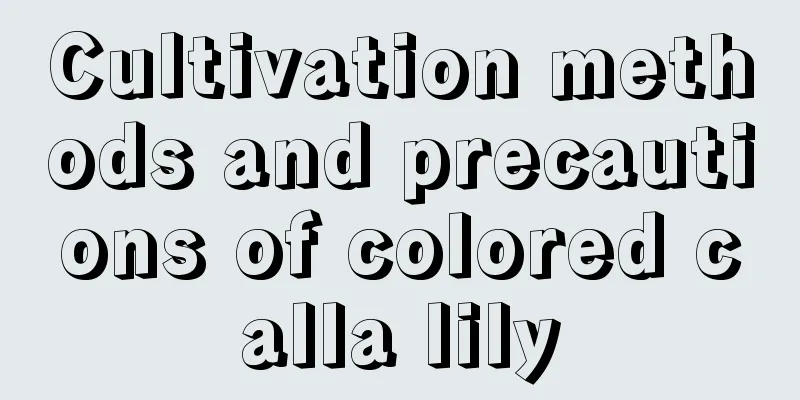Cultivation methods and precautions of colored calla lily

1. Maintenance methods1. Soil: Soil with good air permeability is more suitable for its growth. When preparing the soil, you can put a layer of sand at the bottom of the flowerpot, and the top layer can be mixed with garden soil or sandy soil and leaf mold. 2. Temperature: It prefers a cooler growing environment, and the most suitable temperature for its growth is 22-30℃. In the summer, you must pay attention to high temperature and sun protection. When winter comes, you must move it indoors as soon as possible because it is afraid of the cold. 3. Watering: Just keep the soil in the pot slightly moist at ordinary times. There is no need to strictly customize the watering time. If you find that the soil is turning white and dry, water it thoroughly. In summer, you can spray water frequently to keep it moist and clean the leaves. 4. Light: It can be placed indoors during normal maintenance, but it needs more sunlight during its rapid growth stage. The light requirements are different at different stages, just make sure the sunlight is not too strong. 2. Breeding techniques1. Post-flowering care: After its flowers bloom, they will lose their ornamental value, so the withered flowers should be cut off in time. Also pay attention to cutting off the surrounding dead and old branches to avoid waste and excessive loss of nutrients so that it can grow better. 2. Pruning: When repotting, you should also prune the roots appropriately, and remove all the dead and rotten roots to promote the growth of new roots. Just change to a bigger flowerpot, put some soil in it and replant it. 3. Problem diagnosis and treatment1. Yellow leaves: The most common reason is that there is insufficient nutrients in the potting soil, which means it is time to apply fertilizer, which will cause yellow leaves. Fertilizer should be applied to it in time to ensure sufficient nutrients. 2. No flowering: The reason why it does not bloom may be that the temperature of the environment in which it grows is too high. If the temperature is too high, it is not conducive to its flowering, and there must be sufficient light to promote its flowering. Therefore, the temperature should not be too high during maintenance, and the temperature should be lowered to 30℃. IV. Other issues1. Toxicity: Colored Calla Lily is somewhat toxic. It contains alkaloids and herbal calcium crystals, so you must be careful not to eat it accidentally during maintenance. 2. Can it be raised indoors? Although it is poisonous, there is no problem in raising it indoors. Just be sure to place it at a higher place away from children. |
<<: How many years can Lithops be grown?
>>: Cultivation methods and precautions of water shield
Recommend
Can earthworm soil be used to grow succulents?
Can earthworm soil be used to grow succulents? Ea...
If Sansevieria drinks some "yellow water" every 15 days, side buds will sprout one after another, and one tree will turn into 10 trees!
Use yellow water to water "Tiger Piranha&quo...
How to manage blueberries in winter?
Blueberry is grown over a wide area, and the surv...
When and how to transplant hawthorn trees
1. When to transplant Hawthorn trees are highly a...
What should you pay attention to when raising orchids every month?
What should I pay attention to when growing orchi...
What month is suitable for planting morels?
When to plant morels Morels are a type of fungus ...
Causes and treatments for yellow leaves of lily of the valley
1. Excessive watering 1. Reason: Lily likes a hum...
How many days does it usually take for Nepeta to germinate?
Nepeta is a vegetable crop, mainly produced in Hu...
How to grow and water Yulu succulent plants
Jade plant is a succulent plant with exquisite si...
Introduction to Tiger Pilan Varieties, What Are the Varieties of Tiger Pilan?
1. Golden Edge Tiger Pilan This variety of snake ...
When does American mint bloom?
American mint flowering period American mint is n...
How to care for Tillandsia after it blooms
Flowering period of Tillandsia Tillandsia blooms ...
The difference between cucumber and cucumber, cucumber picture
1. Differences between the two Cucumbers and melo...
How to grow beauty aloe
1. Pot soil selection This kind of plant likes a ...
How long is the growing cycle of grapes?
Introduction to Grape Growth Grapes are suitable ...









